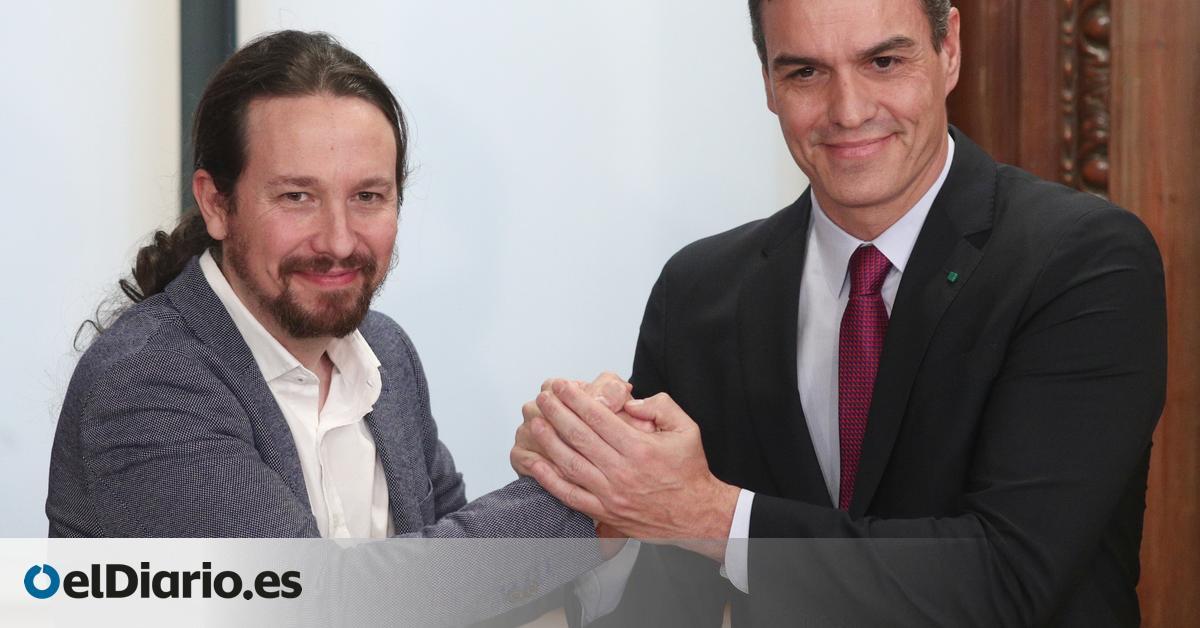
The first state coalition government since the restoration of democracy has its days numbered. The electoral advance of July 23 announced this week by the president precipitates the end of a political coexistence between the PSOE and Unidas Podemos that is often stormy and that, with more or less foundation depending on the moment, has almost always been in question. So much so that the break was once again an option on Pedro Sánchez’s table on the night of 28M and that, even with the elections already called, it is still in force depending on the outcome of the negotiation around Sumar.
A secret electoral advance, at dawn and in the Moncloa: the last all or nothing of Pedro Sánchez
Further
The political reading made in Moncloa of the electoral tsunami of the right in the municipal and autonomic ones discharges a good part of the responsibility on its partners in the Council of Ministers. On the one hand, the Socialists attribute the loss of the vast majority of territorial power to the lack of electoral muscle on their left due to the impossibility of reaching government pacts such as those that the PP has at hand with Vox. And, furthermore, they conclude that to a large extent the demobilization of their own electorate has to do with the level of virulence in the noise generated in recent times in the coalition.
For this reason, at the very moment that Pedro Sánchez and his team opted for electoral advancement, they adopted one more decision: to separate the balance of government from the point of view of management, which will continue to be claimed, from a coalition formula that the socialists no longer plan to extol it again and from which, strategically, they intend to turn the page.
In practice, the president himself has considered for months that the bridges have been blown up, mainly with the ministers of Podemos, Ione Belarra and Irene Montero, since the political crisis that resulted from the reform of the Law on Sexual Freedom. But then the decision was not to take that de facto break to the last consequences. The departure of the Executive of the holders of Social Rights and Equality was not carried out to avoid the story of a general failure of a progressive coalition government that aspired to revalidate at the polls, a scenario that now seems distant.
The weeks that this political crisis of ‘only yes is yes’ lasted were the turning point of the legislature. Many PSOE leaders conveyed to Pedro Sánchez those days the party’s deep discomfort with Podemos, which went so far as to accuse its partners of defending “the penal code of the herd”, of “betraying feminism” or even encompassing them in a “a handful of fascists who intend to return to silence and guilt.”
There are those who think in the PSOE that this crisis would have deserved a coup of authority by the President of the Government that, in some way, would have also alleviated the punishment at the polls last Sunday. Something that, in the past, is also shared today even in the environment of the president.
Slopes of Adding
On the night of May 28, the hypothesis of a break in the coalition was finally ruled out because the president wanted to convey a message of assuming responsibility in the first person and launched a last political ordeal in search of an all or nothing on July 23. But the departure of the Government of the ministers of United We Can continues to be absolutely ruled out.
For months, Pedro Sánchez has been closely following the steps of his second vice president, Yolanda Díaz, in the formation of the Sumar political project. The leader of the Executive has come to personally transfer to Galician politics his concern about the escalation of tensions in that space, mainly between Díaz herself and former vice president Pablo Iglesias. Pointed out as a continuous source of noise less than 50 days before the general elections, the lack of agreement between the left to go to the polls together under the umbrella of Sumar is perceived in Moncloa as an “unassumable” scenario that would rethink the possibility of a departure from the Council of Ministers of the PSOE partners.
If the lack of agreement on the left materializes, the intention in the PSOE is to definitively distance itself from a space in which they predict that “they will go to the brawl between now and July, in a pitched battle.” A scenario in which the Socialists also see an opportunity to appeal to the useful vote and recover part of the ground lost in its day among the progressive electorate, an objective also relevant in the eyes of the party even in the hypothesis of having to go over to the opposition.
It would be, in this case, the second break between Pedro Sánchez and Podemos in just four years. The first was precisely on account of the negotiations to form a government. “Today I could be president if I had accepted the impositions of Iglesias but I could not sleep peacefully at night,” he said in an interview on laSexta. After the electoral repetition of November 10, 2019, the polls convinced Sánchez that, whether or not he could fall asleep, his only option to form a government was through a coalition with those of Pablo Iglesias that the president has defended throughout the legislature. Until the polls, last 28M, convinced him otherwise again.
——————————
we need you more than ever
The electoral result of the municipal and regional elections leaves no room for doubt. A reactionary wave is coming and most of the media are swimming in the same direction. elDiario.es has become one of the few leading newspapers, with the ability to set the agenda and uncover exclusive investigations, which remains independent and is not captured by the right. If you believe that journalism matters and affects our lives, please support us. Today we need you more than ever. Become a member, become a member, of elDiario.es
Source: www.eldiario.es

